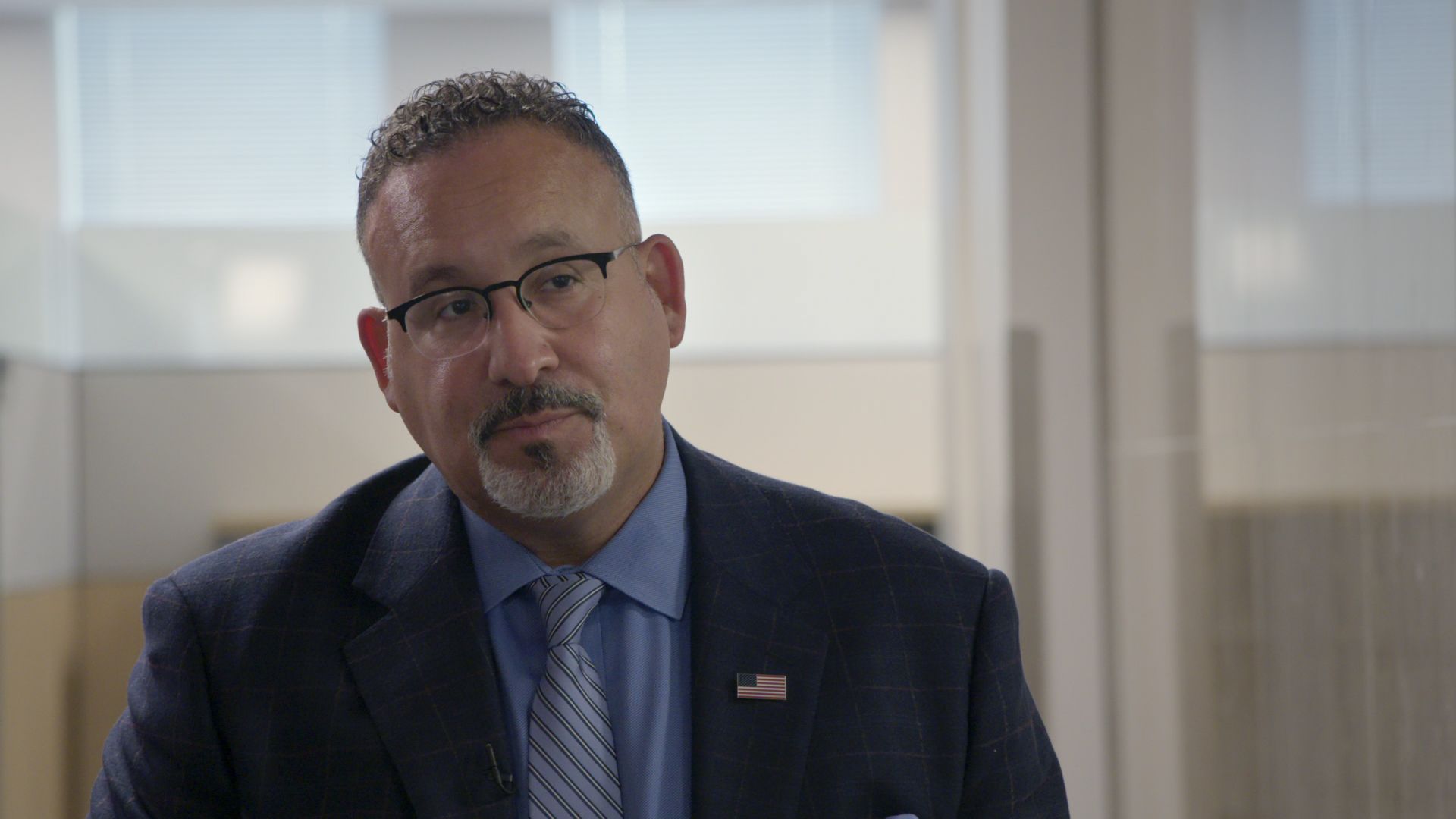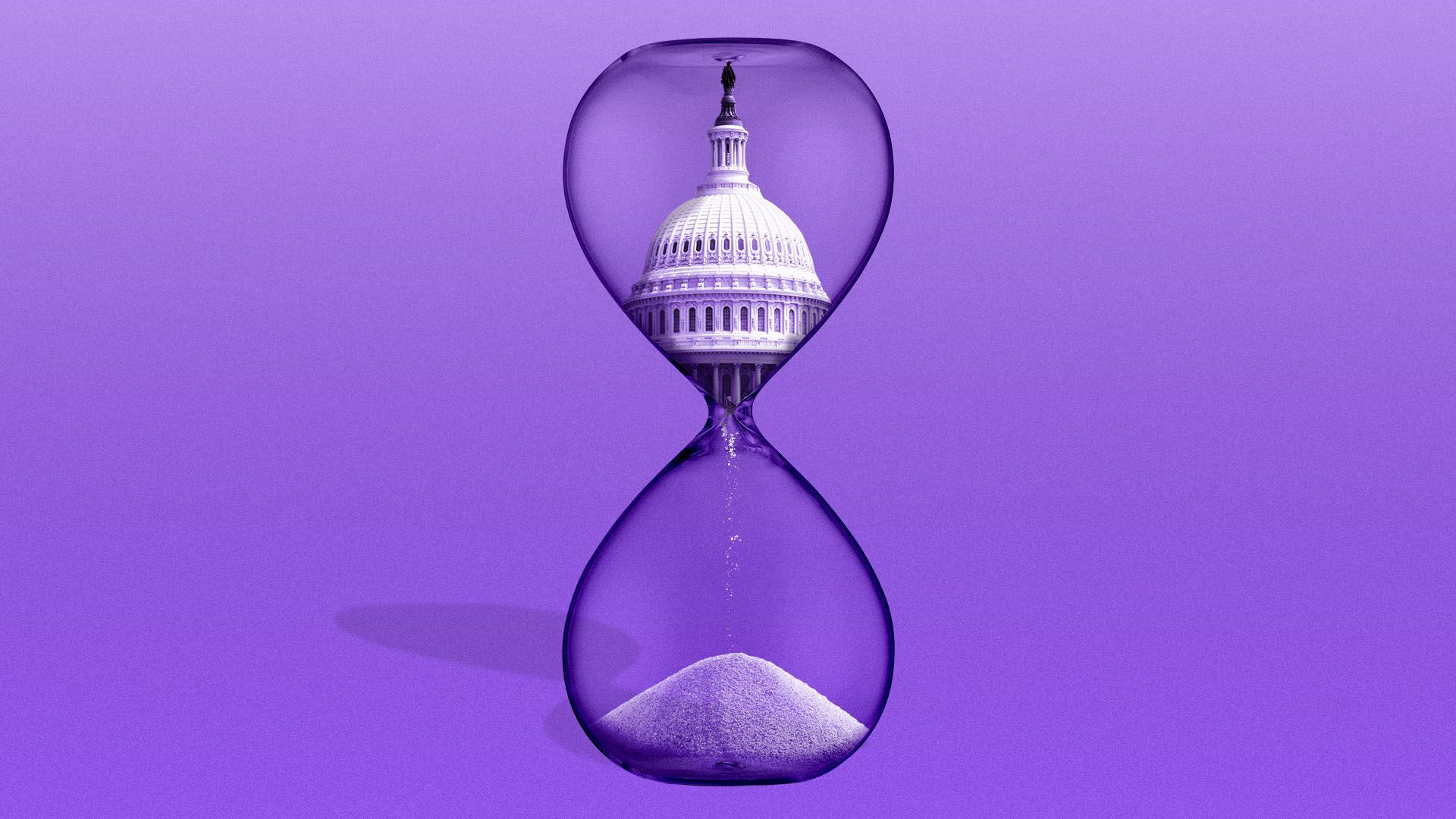| | | | | | | Presented By UnitedHealth Group | | | | Axios Sneak Peek | | By the Axios Politics team ·Oct 17, 2021 | | Welcome back to Sneak. 📅 Join Axios' Sara Kehaulani Goo and Ina Fried on Tuesday at 12:30pm ET for a virtual event examining the current inequities within hiring practices, product development and machine learning in the tech industry today. Guests include Girls Who Code CEO Tarika Barrett and TechEquity Collaborative co-founder and CEO Catherine Bracy. Register. Smart Brevity™ count: 1,605 words ... 6 minutes. Edited by Glen Johnson. | | | | | | 1 big thing: Feds won't punish schools |  | | | Photo: "Axios on HBO" | | | | U.S. Education Secretary Miguel Cardona, in an "Axios on HBO" interview, told Jonathan Swan he's reluctant to withhold federal funding from states that won't enforce school mask mandates because he doesn't want to hurt students. Why it matters: Cardona's comments suggest there are limits to how far the Biden administration will go in pressuring states to adopt universal masking — or vaccine mandates. - California became the first state to say vaccines will be required for in-person learning after shots for K-12 age groups are approved.
- Cardona also said he's looking to President Biden's "Build Back Better" agenda, and the Democrats' push for about $2 trillion in new social spending, as ways to improve the U.S. return on investment in education compared with other nations.
Driving the news: The administration has recommended universal masking in schools. But more than 30 governors have refused to implement such mandates — and some have gone so far as to ban them. - The administration has threatened legal action against seven states.
What they're saying: "I don't know that holding funds from students is the best approach," Cardona told "Axios on HBO" when asked about enforcing mask mandates. "Ultimately, the students need more support, not less. - "But we're working with our districts. And, thankfully, the superintendents, who are educators, are working closely with health experts to keep their children safe."
Infection rates in children have surpassed those of adults nationwide, as more adults get vaccinated and children return to crowds in classrooms. - Children, however, are statistically far less likely to become severely ill from COVID-19.
- But of more than 6 million children who have tested positive for the coronavirus since the pandemic, about 1 million of them had tested positive just since September.
What we're watching: Since the Trump administration, data shows a jump in parents taking their children out of traditional public schools. - There are a variety of factors, from varying uses of remote and in-person learning to mask and other mandates.
- Enrollment in traditional public schools decreased by more than 1 million students in the 2020-21 school year, a 3% drop. Enrollment in public charter schools increased by 7% in the same period, and more parents chose options including private schools and home-schooling.
Keep reading. 📺 Watch the interview. |     | | | | | | 2. Manchin's red lines |  | | | Illustration: Annelise Capossela/Axios | | | | Sen. Joe Manchin (D-W.Va.) has told the White House the child tax credit must include a firm work requirement and family income cap in the $60,000 range, people familiar with the matter tell Axios' Hans Nichols. Why it matters: While Manchin's demands would dramatically weaken one of Biden's signature programs to help working families, they also would reduce the package's overall costs. - That would make it easier for the pivotal senator to support a final package, potentially higher than Manchin's previous $1.5 trillion top line.
- At the same time, progressives would have a hard time accepting the changes Manchin is demanding.
- They'd also fundamentally alter a program the president funded for one year in the $1.9 trillion COVID-19 relief package passed in March.
- Manchin's office declined to comment on Axios' report.
The big picture: Manchin and Sen. Kyrsten Sinema (D-Ariz.) held a call with House centrist lawmakers last Wednesday in which the senators detailed some of their specific concerns about Biden's $3.5 trillion social spending plan. They also discussed the White House's decision to link the package to approval of the separate $1.2 trillion infrastructure bill — a demand of House progressives. - Sinema told lawmakers she will not vote for the social spending plan until the House passes the infrastructure bill, according to Reuters.
- Neither Manchin nor Sinema endorsed Biden's compromise price for the social spending plan in the $1.9 trillion to $2.2 trillion range.
- Manchin also continues to privately tell colleagues the president's Clean Electricity Performance Program, a cornerstone of Democrats' plan to achieve zero-carbon electricity, is a non-starter.
Go deeper: While Manchin has previously indicated he wanted progressive to pick one of Biden's three programs to help working families, he now seems more favorably disposed to policies that target families with young children in need. - In addition to the pared-back CTC, Manchin is open to Biden's $450 billion plan to subsidize day care and offer free universal preschool, the people familiar with the matter told Axios.
- Manchin, however, wants to impose stricter income caps on the day care subsidies while keeping preschool free for everyone, as it already is in West Virginia.
- The senator is less interested in the $225 billion to $450 billion paid family leave proposal or $400 billion for a new program to provide elder care, according to people familiar with the matter.
Keep reading. |     | | | | | | 3. By the numbers: State action |  Data: Quorum; Chart: Will Chase/Axios New York has had the busiest state lawmakers this year, with an average of 70 bills introduced per legislator, although that doesn't necessarily mean they become law, according to a new analysis from Quorum reviewed by Axios' Stef Kight. By the numbers: New York state lawmakers introduced 30 more bills per legislator, on average, than their counterparts in Illinois, the next busiest state. Yet the New Yorkers enacted 420 new state laws between Jan. 1 and Aug. 25, compared to 661 for Illinois legislators. Between the lines: States, territories and districts have different ratios of lawmakers to population. - The study found that a state with more legislators generally led to more legislation being introduced. Nonetheless, there was no correlation between the number of legislators and the number of bills actually enacted.
- Quorum's analysis also suggested no correlation between partisanship and the number of bills introduced or enacted.
- Seven of the eight top state-level legislatures for introducing bills, including D.C., are controlled by Democrats, with the exception of Texas. That's despite the Republicans controlling more state-level legislatures than Democrats.
|     | | | | | | A message from UnitedHealth Group | | How UnitedHealth Group is working to expand access to care | | |  | | | | UnitedHealth Group believes everyone should have access to high-quality, affordable health care that meets their unique needs. See how we are: - Committed to achieving universal coverage.
- Connecting people to virtual care.
- Supporting the health workforce.
| | | | | | 4. RNC woos Texas Latinos |  | | | A pro-Trump protester in Austin, Texas, after Joe Biden's victory. Photo: Sergio Flores/AFP via Getty Images | | | | The Republican National Committee is working to court more conservative Hispanic voters in south Texas, even as the state's GOP majority uses redistricting to blunt demographic changes that should be empowering Hispanic representation and helping Democrats. Driving the news: The RNC is opening a Hispanic community center in San Antonio on Monday, Axios' Shawna Chen reports in her Sneak Peek debut. It's the third such outreach center the party has opened in south Texas this year. - The effort comes as Republicans try to win back a handful of seats to regain control of the House of Representatives in 2022.
- It also follows a weekend in which the Texas House approved a plan — on a party-line vote — that would reduce the number of Hispanic-majority districts statewide to seven from eight.
- That change will help preserve GOP dominance in the state for the next decade.
The other side: The Democratic National Committee has launched a nationwide, $25 million initiative aimed at boosting voter protection among communities of color. - It includes litigation efforts against voting restrictions, and online tools helping identify who's impacted by the laws, according to spokesperson Lucas Acosta.
- In the Rio Grande Valley, the organization is investing in combating right-wing disinformation among Hispanics, he added.
Why it matters: While people of color overwhelmingly voted for Joe Biden during the 2020 election, Republicans made gains with some Latinos. - These RNC centers are intended to serve as hubs for candidate recruitment, casual gatherings and GOTV efforts. The efforts will be in tandem with broader messaging tailored to U.S.-born Latinos, immigrants and college-age voters.
- Republicans are seeking to appeal to Latino voters on conservative values, border security, the economy and opposition to socialism.
- RNC communications director Danielle Alvarez says the focus is on having "meaningful conversations that will help us win elections but also grow our party and better represent these communities."
Details: The new San Antonio center sits in a competitive district held by Rep. Tony Gonzales (R-Texas). He told Axios this type of engagement can be critical for Republicans trying to win traditionally Democratic districts or to keep seats in swing districts. - "Many of these communities have felt forgotten by the Republican Party for a very long time," he said. "Show up early, show up often, and victory will be easier to obtain."
Keep reading. |     | | | | | | 5. Congress begins yearend sprint |  | | | Illustration: Sarah Grillo/Axios | | | | The House and Senate face an onslaught of deadlines key to fulfilling members' campaign promises and keeping the government afloat as they return from recess this week. Why it matters: The next few weeks will be pivotal to enacting the president's agenda — and determining how the Democratic Party fares in the midterm elections, writes Axios' Alayna Treene. The latest: The main focus for the remainder of this month will be to wrap up negotiations on Biden's social spending package, which is being trimmed from $3.5 trillion to closer to $2 trillion. - Leaders on both ends of Pennsylvania Avenue are losing patience and are eager to strike a detailed framework — at a minimum — allowing House Democrats to finally pass the $1.2 trillion bipartisan infrastructure bill.
- As of now, moderate and progressive factions within the House Democratic caucus are still far apart on key provisions, including prescription drug reform, climate change and Medicare expansion.
- They also haven't agreed on a top-line number.
Between the lines: This will be crucial for reaching a compromise, if members want to meet their Oct. 31 deadline. Without an agreement, a reconciliation vote will likely slip to late November or December. - Congress also will have its hands full with meetings and subpoenas by the House Jan. 6 Select Committee.
- The Senate faces a backlog for confirming key ambassadors.
- Both chambers must address national defense funding and a looming government shutdown and debt ceiling crisis.
Keep reading for dates and deadlines. |     | | | | | | 6. Pic du jour |  | | | Photo: Allen J. Schaben/Los Angeles Times via Getty Images | | | | Former President Clinton, with his wife, Hillary Rodham Clinton, was discharged from UC Irvine Medical Center in California this morning. - He had been treated for a urological and blood infection.
|     | | | | | | A message from UnitedHealth Group | | Expanding access to care will improve long-term health | | |  | | | | Millions of Americans each year do not receive recommended preventive care that can help detect and treat disease. UnitedHealth Group is committed to: - Increasing the number of people who receive preventive care services over the next decade.
- Closing 600 million gaps in care by the end of 2025.
| | | | 📬 Thanks for starting your week with Sneak. A reminder that your family, friends and colleagues can subscribe to Sneak or any of Axios' other free newsletters through this link. |  | | It'll help you deliver employee communications more effectively. | | | | | | Axios thanks our partners for supporting our newsletters. If you're interested in advertising, learn more here.
Sponsorship has no influence on editorial content. Axios, 3100 Clarendon Blvd, Suite 1300, Arlington VA 22201 | | | You received this email because you signed up for newsletters from Axios.
Change your preferences or unsubscribe here. | | | Was this email forwarded to you?
Sign up now to get Axios in your inbox. | | | | Follow Axios on social media:    | | | | | |











No comments:
Post a Comment